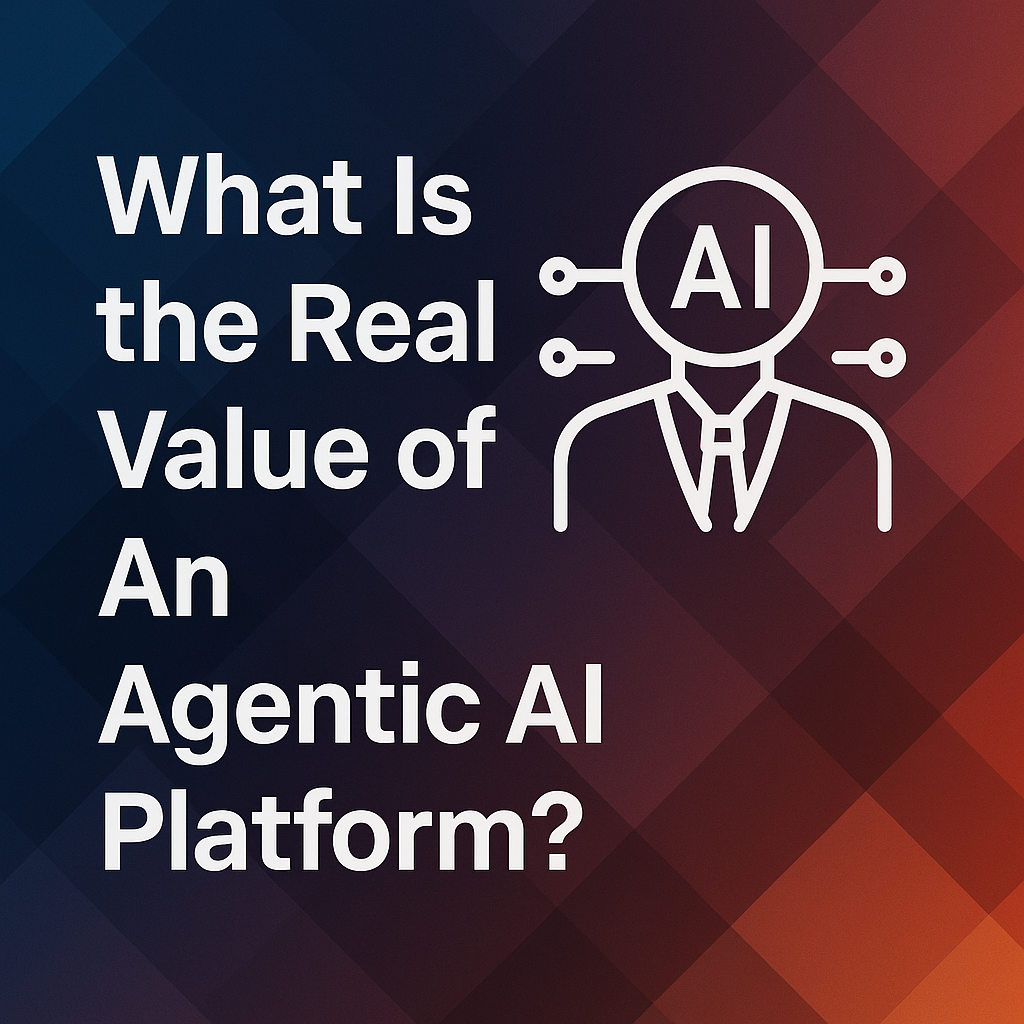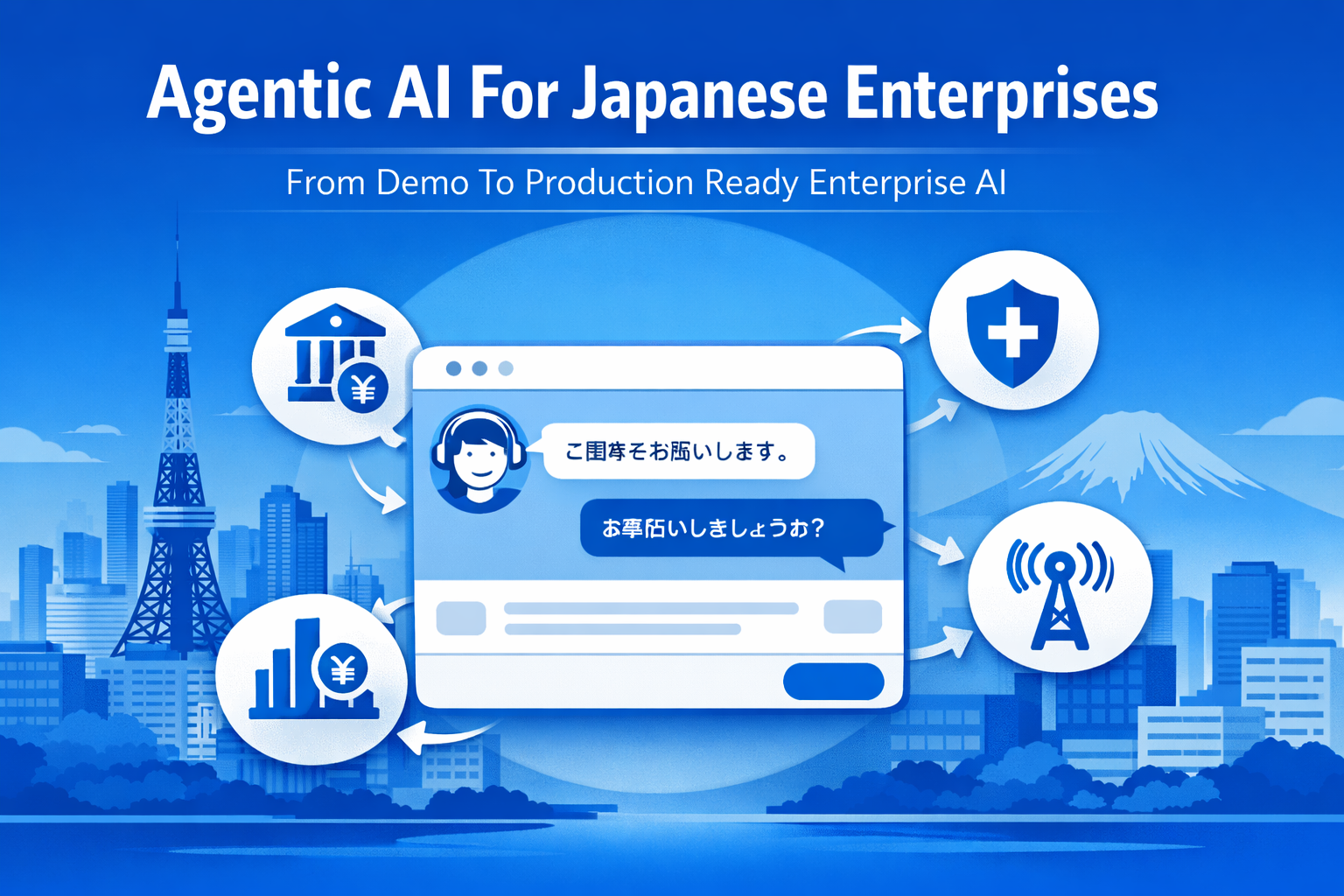Building Unique Workflows With A Modern Agentic AI Platform

What Is the Real Value Of An Agentic AI Platform?
The enterprise technology landscape has witnessed countless revolutions, but few have promised the fundamental shift we're seeing with agentic AI. As organizations grapple with mounting operational complexity, rising customer expectations, and fierce competition, a critical question emerges: what tangible value does an agentic AI platform actually deliver beyond the marketing hype?
The answer lies not in incremental efficiency gains, but in a complete reimagining of how enterprises operate, decide, and scale.
The Evolution Beyond Traditional Automation
For decades, businesses have chased automation as the holy grail of operational efficiency. We've progressed from simple macros to robotic process automation, from chatbots to sophisticated workflow engines. Yet despite these advances, most organizations still find themselves trapped in a cycle of reactive problem-solving, manual oversight, and siloed systems that can't talk to each other.
Traditional automation excels at repeating predefined tasks. It follows scripts, executes rules, and handles volume. But it fundamentally lacks agency the ability to understand context, make judgment calls, adapt to novel situations, and take autonomous action toward defined goals without constant human intervention.
This is where an agentic AI platform fundamentally diverges from everything that came before.
Understanding True Agentic AI: Beyond the Buzzwords
An agentic AI platform represents a paradigm shift from reactive automation to proactive intelligence. Unlike conventional systems that wait for triggers and follow predetermined paths, agentic AI agents possess several transformative capabilities:
Goal-Oriented Autonomy: These systems don't just execute tasks they understand objectives. Give an agentic AI platform a business goal, and it will determine the optimal path, coordinate necessary actions, and adapt its strategy as conditions change.
Contextual Intelligence: Agentic AI agents analyze multiple data streams simultaneously, understanding not just what's happening, but why it matters. They recognize patterns, anticipate needs, and make decisions based on comprehensive situational awareness.
Continuous Learning: Every interaction, every outcome, every edge case feeds back into the system's knowledge base. An agentic AI platform becomes more capable over time, refining its strategies and expanding its problem solving repertoire.
Multi-Agent Collaboration: Perhaps most powerfully, these platforms coordinate multiple specialized AI agents, each with distinct expertise, working in concert to solve complex, multi-faceted business challenges.
The Real Business Value: Where Theory Meets Impact
The transformative potential of an agentic AI platform manifests across multiple dimensions of enterprise value:
1. Operational Resilience at Scale
Modern businesses face unprecedented volatility supply chain disruptions, market fluctuations, regulatory changes, and competitive pressures that emerge overnight. An agentic AI platform doesn't just respond to these challenges; it anticipates them.
By continuously monitoring operational signals and market indicators, agentic AI agents identify potential disruptions before they cascade into crises. They automatically trigger contingency protocols, reroute workflows, and reallocate resources all without waiting for human decision-makers to assess the situation.
This level of automation transforms risk management from a reactive discipline into a proactive competitive advantage.
2. Decision Velocity and Quality
In the digital economy, the speed and accuracy of decision-making often determines market leaders from laggards. Yet human decision-makers, no matter how skilled, face cognitive limitations when processing vast data sets, multiple variables, and time-sensitive choices.
An agentic AI platform augments human judgment with machine-speed analysis. It processes thousands of data points in milliseconds, runs probabilistic scenarios, and presents actionable recommendations grounded in comprehensive analysis. More importantly, for routine decisions that don't require human oversight, it acts autonomously freeing executives to focus on strategic initiatives that genuinely require human creativity and judgment.
3. Customer Experience Revolution
Customer expectations have evolved beyond quick response times. Today's consumers expect personalization, empathy, consistency across channels, and resolution of complex issues without endless transfers or repetitive explanations.
Traditional customer service automation frustrates as often as it helps rigid conversation flows, inability to handle nuanced requests, and the dreaded "I don't understand, please rephrase" response. An agentic AI platform changes this equation entirely.
These systems understand customer intent, context, and emotion. They handle multi-turn conversations that span topics, reference previous interactions, and seamlessly escalate to human agents when appropriate all while maintaining conversation continuity. They don't just answer questions; they solve problems, anticipate needs, and create genuinely satisfying experiences.
4. Exponential Productivity Without Proportional Headcount
Perhaps the most compelling value proposition: an agentic AI platform enables hypergrowth without linear scaling of workforce costs. As business volume increases, AI agents handle the expanding workload with minimal additional infrastructure investment.
This isn't about replacing people it's about amplifying their impact. By offloading routine cognitive tasks to AI agents, organizations elevate their workforce to higher-value activities that require uniquely human capabilities: creative problem-solving, relationship building, strategic thinking, and innovation.
5. Cross-Functional Intelligence Integration
Most enterprise systems operate in silos CRM doesn't seamlessly communicate with supply chain management, customer service operates independently from product development, and marketing automation runs parallel to sales operations. This fragmentation creates inefficiencies, blind spots, and missed opportunities.
An agentic AI platform serves as an intelligent orchestration layer, connecting disparate systems and enabling coordinated action across functions. When a customer service AI agent identifies a product quality concern, it can automatically notify product teams, adjust inventory forecasts, and proactively reach out to potentially affected customers all without manual coordination across departments.
Real-World Transformation: When Agentic AI Meets Enterprise Challenges
The theoretical benefits of agentic AI become concrete when examining organizations that have successfully deployed these platforms in demanding, high-stakes environments.
Voice-First AI: Revolutionizing Customer Engagement
Consider the unique challenges of voice-based customer service arguably one of the most complex AI applications. Voice interactions demand not just natural language understanding, but emotional intelligence, cultural awareness, accent accommodation, and the ability to handle interruptions, background noise, and the messy reality of human communication.
gnani.ai has pioneered voice-powered agentic AI platforms that handle these complexities at enterprise scale. Their AI voice agents process millions of customer interactions across banking, insurance, and retail sectors industries where stakes are high, regulations are strict, and customer tolerance for friction is minimal.
The results speak to the tangible value of mature agentic AI platforms: call handling time reduced by 15%, agent efficiency improved by 40%, and authentic, human-like engagement delivered across 40+ languages. These aren't marginal improvements they represent fundamental transformation of customer service economics.
What makes their approach particularly noteworthy is the integration of multimodal AI capabilities within the HumanOS platform. By combining voice processing, natural language understanding, and emotional intelligence, gnani.ai has created digital humans that handle complex customer needs with empathy and precision. Their Agent Builder and extensive template library democratize access to sophisticated AI agents, enabling enterprises to deploy customized solutions without extensive AI expertise.
No-Code Democratization: Making Agentic AI Accessible
A powerful agentic AI platform means little if it requires armies of data scientists and months of implementation time. The real breakthrough comes when enterprises can rapidly deploy and customize AI agents without specialized technical resources.
This is where platforms like Inya.ai demonstrate the maturation of agentic AI technology. Built on gnani.ai's voice-first foundation, Inya.ai offers a no-code approach to multi-agent orchestration enabling business teams to design, deploy, and manage AI agents tailored to their specific needs.
The platform's multi-agent architecture allows different specialized agents to handle distinct business functions sales qualification, payment collections, customer support, contextual upselling while maintaining conversation continuity and shared context. An AI agent working with a customer on technical support can seamlessly transition to discussing renewal options or upsell opportunities, all within a natural conversation flow.
What differentiates Inya.ai is its sophisticated memory and context management. Every customer interaction is remembered, personalized, and built upon in future engagements. Customers never experience the frustration of repeating information or being treated as strangers despite years of relationship history.
Organizations deploying Inya.ai report measurable ROI within months through labor cost reduction, operational efficiency gains, and tangible improvements in customer satisfaction scores. This rapid value realization makes the business case for agentic AI platforms compelling even for traditionally cautious enterprise buyers.
Strategic Imperatives: Why Agentic AI Platforms Are No Longer Optional
The competitive dynamics of modern business increasingly favor organizations that can operate with greater speed, intelligence, and adaptability. As customer expectations continue escalating, operational complexity multiplies, and market windows shrink, the gap between AI-enabled enterprises and traditional operators will widen dramatically.
An agentic AI platform isn't just another technology investment it's infrastructure for competing in an AI-native economy. Organizations that delay adoption risk more than missed efficiency opportunities; they risk strategic irrelevance.
The Compounding Returns of Early Adoption
AI agents improve with use. Every customer interaction, every resolved issue, every workflow optimization feeds data back into the system, making it more capable. Early adopters of agentic AI platforms build competitive moats through accumulated learning and refined processes that later entrants will struggle to replicate.
From Cost Center to Profit Center
Perhaps most significantly, an agentic AI platform transforms traditional cost centers into strategic assets. Customer service becomes a data-driven insights engine. Operations become a source of continuous innovation. Support functions become proactive growth drivers.
This isn't about doing the same things cheaper it's about unlocking entirely new value streams that weren't economically viable without AI-powered automation at scale.
Making the Transition: Practical Considerations for Enterprise Leaders
For organizations ready to explore agentic AI platforms, several considerations determine success:
Start with High-Impact, High-Volume Use Cases: Don't try to transform everything at once. Identify processes where automation delivers immediate value customer inquiries, routine transactions, data processing, or qualification workflows.
Prioritize Integration Capabilities: An agentic AI platform's value multiplies when it connects to existing systems. Ensure your chosen platform offers robust APIs, multi-channel support, and compatibility with your technology ecosystem.
Plan for Change Management: The most sophisticated technology fails without organizational adoption. Prepare teams for new ways of working, address concerns about automation, and celebrate early wins to build momentum.
Measure What Matters: Define clear success metrics beyond simple cost reduction. Track customer satisfaction, employee productivity, decision speed, and business outcomes enabled by AI agents.
Choose Partners, Not Just Vendors: The complexity of agentic AI deployment requires expertise, ongoing optimization, and strategic guidance. Select platform providers committed to your long-term success, not just initial sale.
Transform Your Enterprise with Agentic AI
The question isn't whether agentic AI platforms will reshape enterprise operations they already are. The question is whether your organization will lead this transformation or struggle to catch up.
If you're ready to explore how voice-powered agentic AI can revolutionize your customer engagement, improve operational efficiency, and unlock new growth opportunities, schedule a personalized demo with gnani.ai's experts and see the technology in action.
For teams seeking rapid, no-code deployment of multi-agent solutions, discover how Inya.ai can deliver measurable ROI within months of implementation.
The future of enterprise operations is autonomous, intelligent, and adaptive. The technology to build that future exists today.
Frequently Asked Questions
What exactly distinguishes an agentic AI platform from traditional automation tools?
An agentic AI platform goes far beyond rule-based automation by enabling autonomous decision-making, goal-oriented behavior, and contextual adaptation. While traditional automation executes predefined tasks, agentic AI agents understand objectives, plan multi-step actions, learn from outcomes, and collaborate with other agents to solve complex business challenges all with minimal human intervention.
How quickly can enterprises expect to see ROI after implementing an agentic AI platform?
Most organizations deploying mature agentic AI platforms report measurable returns within 3-6 months. ROI manifests through multiple channels: reduced labor costs for routine tasks, improved operational efficiency, faster customer resolution times, and increased revenue from better customer engagement. The exact timeline depends on use case complexity, integration requirements, and deployment scale.
Can agentic AI platforms integrate with our existing enterprise systems and workflows?
Modern agentic AI platforms are designed for seamless integration with existing technology ecosystems. Leading solutions offer robust APIs, support for multi-channel communication (voice, chat, email, messaging), and connectors for common enterprise systems like CRMs, ERPs, and helpdesk platforms. The goal is augmentation of current processes, not wholesale replacement of functional systems.
Will adopting an agentic AI platform lead to workforce reductions?
The most successful implementations of agentic AI platforms focus on workforce elevation, not replacement. AI agents handle repetitive, high-volume tasks, freeing human employees for higher-value activities requiring creativity, complex problem-solving, and relationship building. Many organizations report improved employee satisfaction as teams shift from mundane tasks to more fulfilling strategic work.
What industries benefit most from deploying an agentic AI platform?
While agentic AI platforms deliver value across sectors, industries with high-volume customer interactions see particularly dramatic impact including banking, insurance, retail, healthcare, telecommunications, and e-commerce. However, any organization dealing with complex operational workflows, multi-step processes, or knowledge-intensive work can achieve significant benefits from AI agent automation.
How do agentic AI platforms handle data privacy and regulatory compliance?
Enterprise-grade agentic AI platforms are built with privacy and compliance as foundational requirements. They offer features like data encryption, access controls, audit trails, and compliance frameworks for regulations like GDPR, HIPAA, and industry-specific requirements. When evaluating platforms, prioritize vendors with demonstrated experience in regulated industries and clear data governance capabilities.
What's required to implement an agentic AI platform successfully?
Successful implementation requires three key elements: clear identification of high-value use cases, integration planning with existing systems, and organizational change management. The most advanced platforms offer no-code deployment options that dramatically reduce technical barriers. Working with experienced implementation partners accelerates time-to-value and helps avoid common pitfalls.
The enterprise landscape is evolving faster than ever. Those who embrace agentic AI platforms today will define tomorrow's competitive standards. The question is: will you lead or follow?








